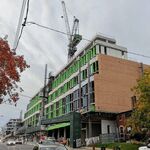wyliepoon
Senior Member
Link to article
Paris skyline may be open to development
JAMES MACKENZIE
Reuters News Agency
September 18, 2007 at 4:04 AM EDT
PARIS — French President Nicolas Sarkozy, not normally seen as a patron of the arts, called for new ideas yesterday to develop Paris over the coming decades and pledged to encourage "bold" thinking by architects.
"The question for us is not to think about the next six months but the next century," Sarkozy said at a ceremony to open a new architectural heritage centre in Paris.
The new museum complex, completed after years of wrangling, will "be the occasion for putting architecture back at the heart of our political choices," he said.
He outlined no specific plans to rival former president François Mitterrand's "Grands Travaux" such as the National Library or the redeveloped Louvre museum, which gave a new face to the French capital in the 1980s.
But he said it was not enough simply to maintain existing architectural treasures.
"Architecture bears witness to a shared past but at the same time, it is a projection towards the future," he said. "Architectural policy has to combine heritage and creation.
"I commit myself fully to this mission, to give back the possibility of boldness to architecture," he said.
Sarkozy's remarks were in line with a tradition of French presidents such as Mitterrand and Georges Pompidou leaving their mark on the capital.
But he may also have had an eye on the mayor of Paris, Bertrand Delanoe, one of the rising leaders of the opposition Socialists, who has built a base with drives to improve life in the capital, most recently with a successful city bike scheme.
Sarkozy said eight to 10 architectural agencies, both French and international, could be commissioned to assess the needs of the greater Paris region "for the next 20, 30, 40 years."
Strict planning laws restricting skyscrapers in Paris have helped to preserve the city's distinctively harmonious appearance. But they have led some to say it risks becoming a museum piece compared with more dynamic capitals such as London and Berlin.
"I think there are certainly some taboos no one dared talk about or touch, for example big-scale projects or skyscrapers," Swiss architect Jacques Herzog told France Inter radio.
But Herzog, whose buildings include the Tate Modern in London and the new National Stadium in Beijing, said he felt that change was in the air. "Until not very long ago, Paris had several projects that were very, very visible in the world and I feel there is an energy there to pick up where we left off 10 or 15 years ago."
Sarkozy left open the question of relaxing planning laws to allow more skyscrapers, but he called for an end to "simplistic" arguments between supporters and opponents of big towers.
Remarking that the widely detested "Tour Montparnasse," a 210-metre black tower that looms over the Paris skyline, had "not made our job any easier," he said: "We can't have a policy of uniform skyscrapers."
But he praised projects such as the curving "Lighthouse" skyscraper being built in the business district La Défense.
Sarkozy, who as interior minister in 2005 cracked down hard on rioting in the poor, run-down suburbs outside Paris and other French cities, said any redevelopment had to include the whole greater city area and strengthen connections between the centre and the suburbs.
"Architecture must also humanize housing developments and suburbs, which have been left to one side for far too long."
Paris skyline may be open to development
JAMES MACKENZIE
Reuters News Agency
September 18, 2007 at 4:04 AM EDT
PARIS — French President Nicolas Sarkozy, not normally seen as a patron of the arts, called for new ideas yesterday to develop Paris over the coming decades and pledged to encourage "bold" thinking by architects.
"The question for us is not to think about the next six months but the next century," Sarkozy said at a ceremony to open a new architectural heritage centre in Paris.
The new museum complex, completed after years of wrangling, will "be the occasion for putting architecture back at the heart of our political choices," he said.
He outlined no specific plans to rival former president François Mitterrand's "Grands Travaux" such as the National Library or the redeveloped Louvre museum, which gave a new face to the French capital in the 1980s.
But he said it was not enough simply to maintain existing architectural treasures.
"Architecture bears witness to a shared past but at the same time, it is a projection towards the future," he said. "Architectural policy has to combine heritage and creation.
"I commit myself fully to this mission, to give back the possibility of boldness to architecture," he said.
Sarkozy's remarks were in line with a tradition of French presidents such as Mitterrand and Georges Pompidou leaving their mark on the capital.
But he may also have had an eye on the mayor of Paris, Bertrand Delanoe, one of the rising leaders of the opposition Socialists, who has built a base with drives to improve life in the capital, most recently with a successful city bike scheme.
Sarkozy said eight to 10 architectural agencies, both French and international, could be commissioned to assess the needs of the greater Paris region "for the next 20, 30, 40 years."
Strict planning laws restricting skyscrapers in Paris have helped to preserve the city's distinctively harmonious appearance. But they have led some to say it risks becoming a museum piece compared with more dynamic capitals such as London and Berlin.
"I think there are certainly some taboos no one dared talk about or touch, for example big-scale projects or skyscrapers," Swiss architect Jacques Herzog told France Inter radio.
But Herzog, whose buildings include the Tate Modern in London and the new National Stadium in Beijing, said he felt that change was in the air. "Until not very long ago, Paris had several projects that were very, very visible in the world and I feel there is an energy there to pick up where we left off 10 or 15 years ago."
Sarkozy left open the question of relaxing planning laws to allow more skyscrapers, but he called for an end to "simplistic" arguments between supporters and opponents of big towers.
Remarking that the widely detested "Tour Montparnasse," a 210-metre black tower that looms over the Paris skyline, had "not made our job any easier," he said: "We can't have a policy of uniform skyscrapers."
But he praised projects such as the curving "Lighthouse" skyscraper being built in the business district La Défense.
Sarkozy, who as interior minister in 2005 cracked down hard on rioting in the poor, run-down suburbs outside Paris and other French cities, said any redevelopment had to include the whole greater city area and strengthen connections between the centre and the suburbs.
"Architecture must also humanize housing developments and suburbs, which have been left to one side for far too long."




